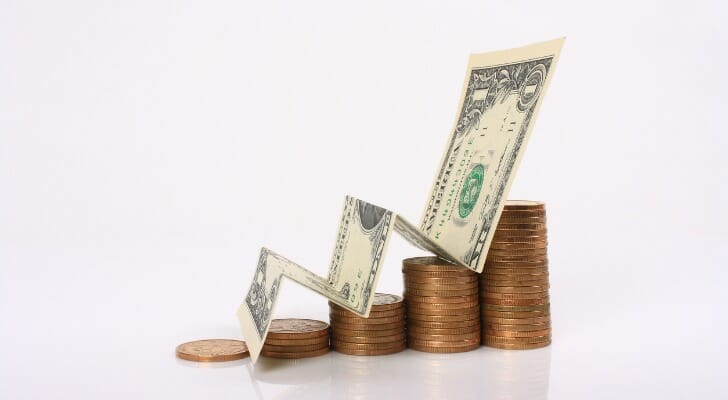A step-up certificate of deposit, or “step-up CD,” is a variable interest deposit product where the rate of interest gradually increases over the term of the certificate. Eventually, the certificate matures and you get back your initial deposit with interest. Overall, these step-up CDs earn less interest than traditional CDs in the short term but can make up for it if you hold for a long-time. Here’s what you need to know about how it works.
You can also work with a financial advisor who can help you determine the right asset allocation for the unique financial goals that you have.
What Is a Step-Up CD?
A traditional certificate of deposit is a banking product that trades flexibility for a greater rate of return. When you buy a CD, you commit your money to the term of the product. For example, say you buy a 12-month certificate of deposit for $1,000. You are putting $1,000 on a deposit with the bank and agreeing not to withdraw it for 12 months. If you do, you pay an early withdrawal penalty.
In exchange for committing your money, the bank pays you a higher rate of interest than it does for most savings products. For example, according to the FDIC at the time of writing the average interest rate on a standard savings account was 0.21%. The average interest on a 12-month certificate of deposit was 0.71%. This is fixed interest, meaning that with a standard certificate of deposit you’ll receive that same interest rate over the lifetime of the product.
A step-up certificate of deposit uses an incremental interest rate instead of the fixed interest rate of a standard product. Periodically the interest rate on a step-up CD increases. This is not variable interest. With a step-up CD, both the schedule and the rate increases are agreed upon beforehand.
For example, U.S. Bank offers a popular 28-month step-up CD with the following terms:
- 05% Months 1 – 7
- 25% Months 8 – 14
- 45% Months 15 – 21
- 65% Months 22 – 28
This means that for the first seven months of the certificate of deposit, you’ll receive 0.05% amortized annual interest. Starting on month eight you will receive the monthly equivalent of 0.25% annual interest, and so on for the lifetime of the product.
Or, TD Bank offers a three-year product on the following terms:
- 05% Year One
- 10% Year Two
- 15% Year Three
As above, this means that for the first year you will receive 0.05% interest. Then you receive 0.10% interest in the second year and 0.15% interest in the third. As with a standard bank certificate of deposit, a step-up certificate commits your funds for the lifetime of the product. If you withdraw your money early you have to pay a penalty. In most cases, that penalty is the equivalent of several months’ worth of interest.
What Are the Benefits of a Step-Up CD?

The key to a step-up CD is what’s called the “blended yield,” sometimes otherwise known as the “composite APY.” This is the average rate of annual interest you’ll receive over the lifetime of the product.
For example, with TD Bank’s step-up CD cited above, you would receive a blended yield of 0.10%. On average, you would make 0.10% per year with this product after accounting for both its low- and high-end rates. Or, with U.S. Bank’s step-up CD, you would receive a blended yield of 0.35% percent interest. Again, this means that your average interest overall 28 months would be 0.35%.
This is the critical number because it tells you how much you’ll actually make off of the certificate of deposit. The high-end number on a step-up CD can be misleading. You will only make that maximum interest rate for a relatively short period of time compared to the lifetime of the asset. And you cannot contribute additional money over the CD’s lifetime to specifically take advantage of its high-interest term.
Comparing a Step-Up CD to Other Products
When comparing a step-up CD to other products, the important question is how its blended yield compares to other rates of return. And the truth is that many, if not most, step-up CDs tend to underperform other products when judged on this basis. For example, take the U.S. Bank product cited above. This is a 28-month CD offering an average of 0.35% interest over the lifetime of the product. That’s less than half the 0.77% national average for a two-year standard certificate of deposit.
TD Bank’s product fares even worse. Offering a blended yield of just 0.10% over a three-year commitment, their rate of return is nearly one-eighth the national average for a three-year CD (also 0.77%).
Nor are these short-term instruments. While a step-up CD might calculate its interest in six-month increments, your money is still locked up for the entire lifetime of the note. Investors looking for short-term schedules should probably consider simply buying a standard CD with a six- or 12-month term instead since that will give them the flexibility that a step-up CD lacks.
When a Step-Up CD Might Be Right For You
A step-up CD can be a smart choice for savers who want predictable returns with the potential to earn more over time. Unlike a traditional certificate of deposit that locks in a fixed rate for the entire term, a step-up CD increases its interest rate at set intervals, giving you a built-in hedge against rising rates. This feature makes it appealing for those who want the safety of FDIC-insured savings but don’t want to miss out if market rates improve.
Step-up CDs are particularly well-suited for conservative investors or retirees who value stability but still want incremental growth. They can also be a good fit if you expect interest rates to rise in the near future and want to take advantage of higher yields without the risk of a market-based investment.
However, a step-up CD might not be ideal if you need frequent access to your cash. These accounts typically come with early withdrawal penalties, meaning you’ll want to commit to keeping your money invested until maturity. If you’re looking for a secure, low-risk option that balances safety with modest growth potential, a step-up CD could be a valuable addition to your savings strategy.
Bottom Line

A step-up certificate of deposit is a CD that increases its interest rate gradually over the lifetime of the asset. It is otherwise a standard certificate of deposit, although they tend to pay lower rates than other traditional CDs you may be accustomed to. The longer you hold a step-up CD, the more you could potentially earn because the rate increases the most later on in the lifecycle of the investment.
Tips for Investing
- You don’t have to make any investment decisions on your own. Instead, consider hiring a financial advisor who can help you create a roadmap for your financial goals and then manage your asset allocation on your behalf. Finding a financial advisor doesn’t have to be hard. SmartAsset’s free tool matches you with vetted financial advisors who serve your area, and you can have a free introductory call with your advisor matches to decide which one you feel is right for you. If you’re ready to find an advisor who can help you achieve your financial goals, get started now.
- When you buy a certificate of deposit, you’re effectively investing in a safe asset secured by the FDIC and your bank. When you buy a stock, you’re investing in a higher-growth asset with no guarantees. How should you decide which is right for you? To help, check out our comparison of stocks versus CDs.
Photo credit: ©iStock.com/Prostock-Studio, ©iStock.com/LUHUANFENG, ©iStock.com/Inside Creative House
